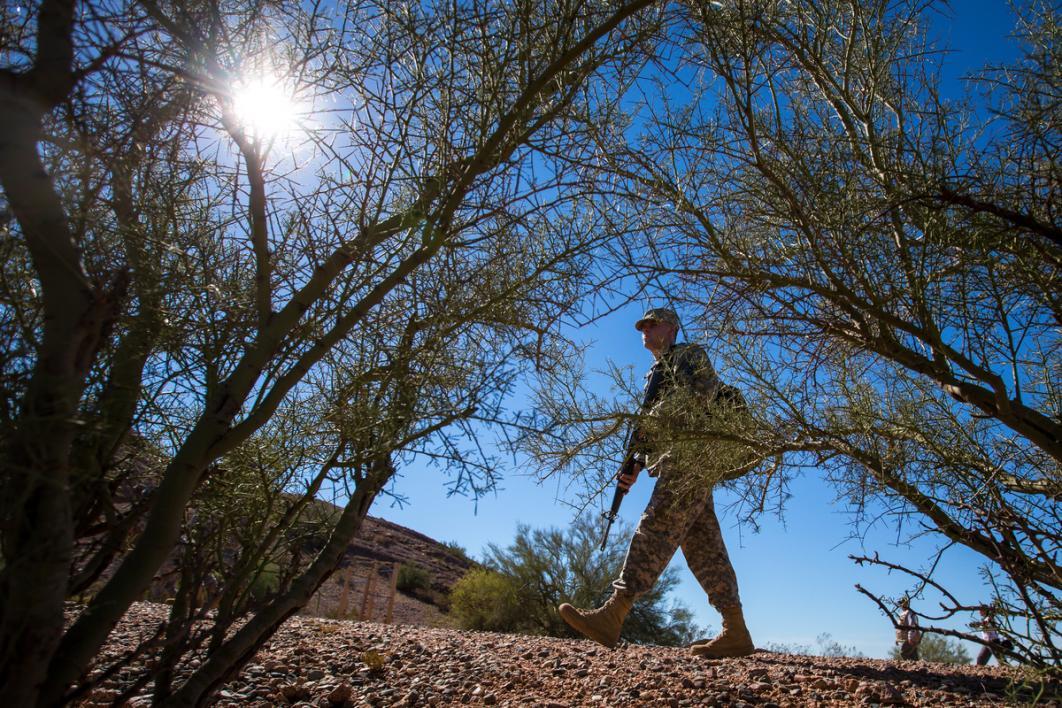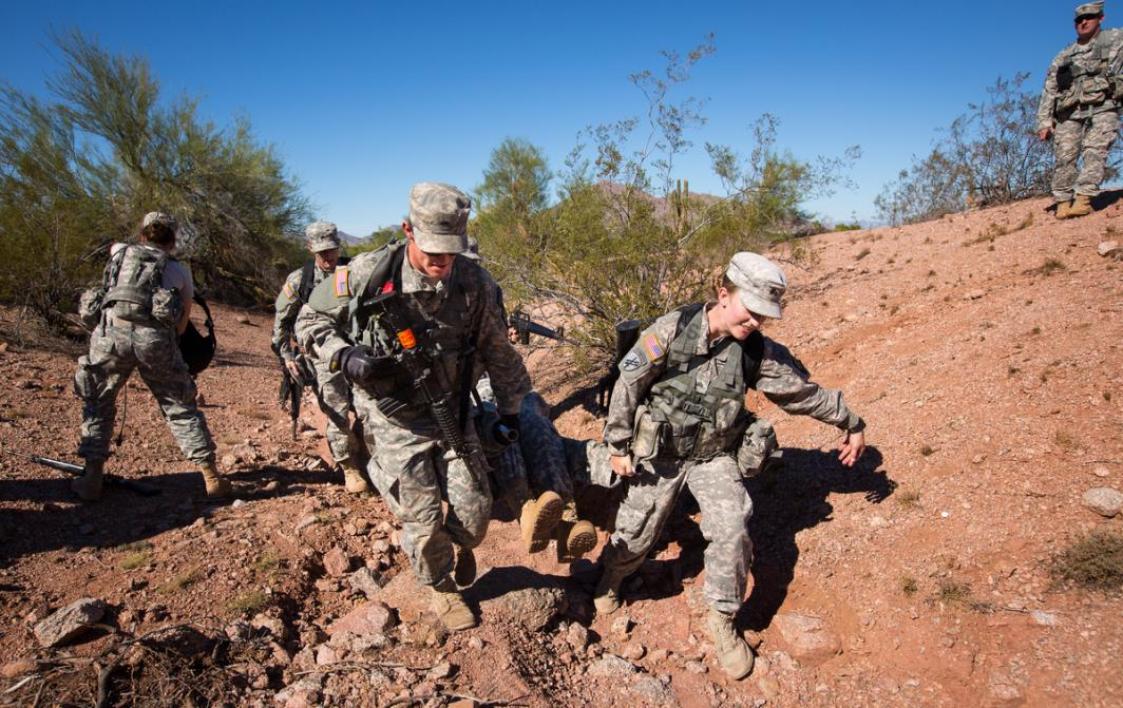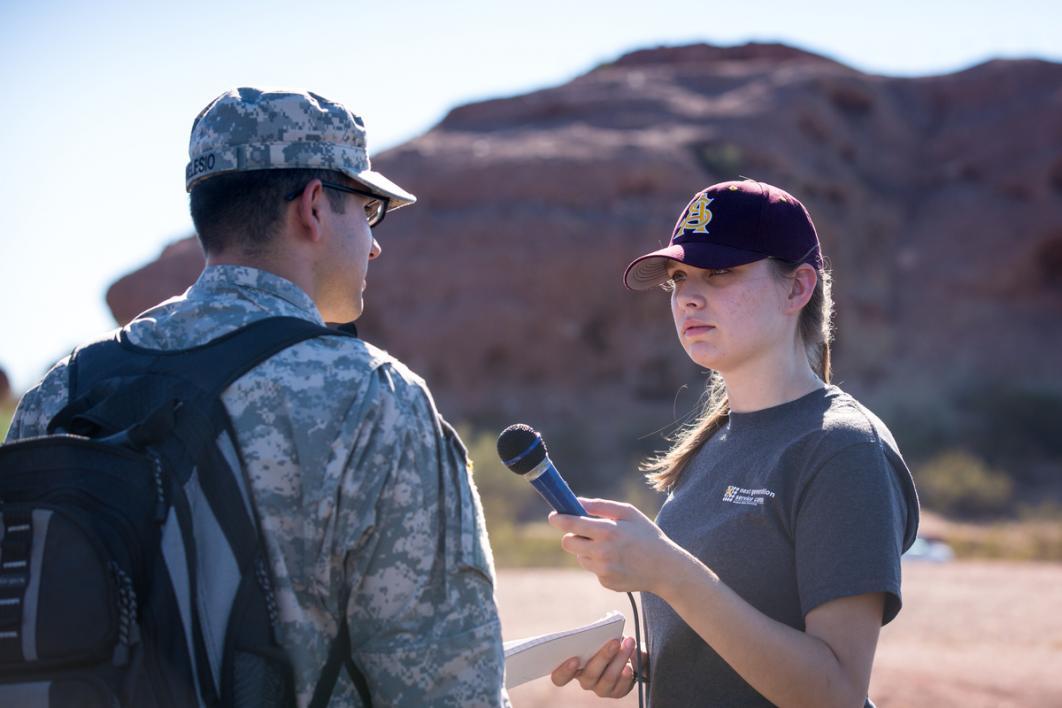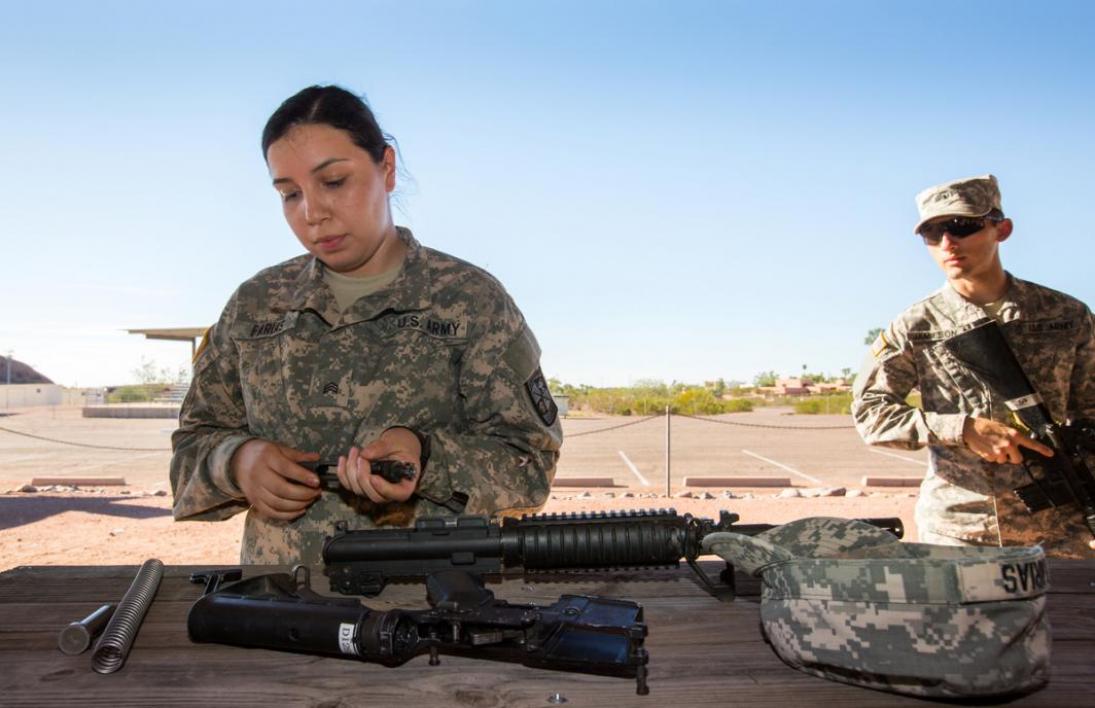War games
ASU Public Service Academy students train with ROTC cadets to understand combat

Michelle Thomas is a history major who wants to bring an understanding of peace to the world.
It’s one of the reasons why she joined Arizona State University’s Public Service AcademyThe Public Service Academy is part of ASU’s College of Public Service and Community Solutions., which aims to train the leaders and altruistic problem-solvers of tomorrow.
So what was she doing holding a dummy rifle during a recent Saturday on a military facility?
To help gain an understanding of how the military responds to a threatening situation or humanitarian goal.
“Today we went through a lot of different courses and different things that officers and soldiers would experience as they’re out in the field,” said Thomas, a freshman. “It’s really cool to see the collaboration and their perspective on how to be a leader and to be able to apply that to mine.”
Thomas was one of 10 students in the academy who participated with cadets of the Sun Devil Battalion in an Army ROTC field training exercise at Tempe’s Papago Military Reservation. The purpose of the exercise was to simulate a deployed environment where Army cadets are engaged with Next Generation Service Corp members to build understanding and trust.
“One of the key issues we’re trying to address with the Public Service Academy is bridging the civilian-military gap because we see the importance of being able to translate between the entities,” said Brett Hunt, founding executive director of the Public Service Academy.

Michelle Thomas, a freshman at Arizona State University, listens during an Army ROTC training exercise at the Papago Military Reservation in Phoenix on Oct. 24, 2015.
Photos by Charlie Leight/ASU Now
“We also want to build strong, well-informed leaders for the future.”
Hunt will lead the first undergraduate program in the nation to integrate cross-sector and civilian-military experiences to develop collaborative leaders of character.
The academy, which started its first cohort in August, got a taste of the future by biting down on some desert dust while performing a variety of tasks — including land navigation, casualty care and evacuation, weapons assembly and disassembly and detainee opportunities.
“The most important thing our students are going to learn from this exercise is they’ll come away with an understanding of who it is that serves in the military, how they operate and gain a greater appreciation for the service they render to this nation,” Hunt said. “For the ROTC cadets, hopefully they’ll realize that military service and civilian service are two sides of the same coin.”
The currency that was most valued during the weekend exercise was teamwork and adaptive leadership. The cadets and academy members were given several tasks to build those skills through a fitness competition, a set of complex problem-solving exercises and intensive instruction.
(Video by Ken Fagan)
“What you learn in the academic environment is totally different than an operational and training environment with a mild amount of stress. The ability to apply what they’ve learned sometimes doesn’t apply to the training environment,” said Lt. Col. Thad Wiest, a professor of military science who has 18 years of military service, including deployments in Iraq and Afghanistan. “This is the time for them to shine when put on the field with other people and we’ll see how they perform.”
BrieAnna Frank’s performance was essential to the exercise. The freshman journalism major was assigned to play a journalist tasked with gleaning information from military officers in a battlefield scenario.
“I’m trying to get them to reveal sensitive information by asking tough questions,” said Frank, who wants to enter the Peace Corps when she graduates. “Ideally, they will find a way to not answer my question or refer me to one of their higher-ups.”
Frank said the exercise was revealing to her on how the military views journalists.
“As a journalism student, I’ve always been the one asking the questions and in the past have only thought of what my motives are. I came here today and I’ve seen first-hand how the military views journalists. So when you know how others view you, you know how to treat them and know what you want to get out of them. In the future when I go into an interview with a person in the military, I know what they’re thinking, and that’s very valuable.”
She’s also gained a healthy respect for the men and women in the military.
“The physical training and being in the sun for hours was brutal. I’m not used to it, but it’s been a good experience. Most people don’t know what it’s like to eat an MRE (Meal, Ready to Eat) or train with the military and I have that now. I also have a new appreciation for what people in the military go through to serve our country.”
Army Master Sgt. Matthew Pizzi said he was impressed with the mental and physical toughness of the Public Service Academy members and their ability to integrate with his troops.
“They were in there every step of the way from the physical competition to the field exercises,” Pizzi said. “At night they ate meals together, stayed up late laughing, telling jokes and were having fun together. I wasn’t going to put a stop to that. That’s what real life soldiers do and that’s how they bond.”
More Law, journalism and politics

Winning the ultimate prize
When Angela Hill left a good-paying job in marketing for a shot at journalism, all she wanted to do was tell stories, inform people and make a difference. And she did exactly that. Her work for ABC…

Who's influencing your favorite influencer?
When your favorite influencer gets on Instagram or TikTok to tout a product, what goes through your mind? Do you think the influencer actually uses the product? Do you wonder whether they are being…

ASU Cronkite School's Retha Hill to be inducted into NABJ Hall of Fame
Retha Hill, an award-winning journalist, entrepreneur and professor at the Cronkite School of Journalism and Mass Communication at Arizona State University, will be inducted into the National…





